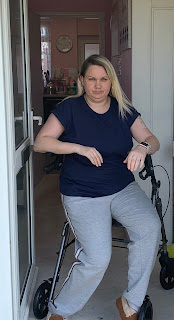 |
| The new 'normal' is frightening |
Not many things frighten me, and ask anyone and they will tell you, despite my disability I try to be as independent as possible (with a few trusted individuals by my side), so then why please tell me has this pandemic made me into a person that is too frightened to leave her front door. Too frightened for her friends to come round and sit in her living room and too frightened for her to go shopping, because for me this is not normal. It’s far from normal. I’ll be honest with you here, it is frightening the hell out of me.
When the country was still 'normal'
Before Covid-19 hit, I wasn’t one for sitting indoors. Now
don’t get me wrong I wasn’t trekking about town from dawn to dusk doing hikes.
I can’t. My disability wouldn’t allow for that unfortunately. My disability
would get so overwhelming on a daily basis that I wouldn’t cope and my outlet
would be, my support worker, myself and my pink power chair getting out for a
small outing. Whether this be a trip to Dunelm to look around or Tesco to buy
dinner for that night nothing major but it would be enough for my brain to calm
down from whatever storm it was concocting that day.
However the day the government announced lockdown, I felt my life disappear before me. That might sound dramatic to you but those little outings were my life-line. The thought of staring at the wall 24/7 was enough to send me into ‘meltdown’ and I will admit, I did send a few texts when I was told to shield by the NHS. The texts were along the line of ‘call me vulnerable one more time, I will show you what vulnerable is’. However think more ladette than lady when reading that sentence in your head. Looking back I shouldn’t but that was my way of coping in the beginning.
Covid has affected my mental health and it's frightening
Since the beginning of lockdown I
have adjusted to being in the house. However the effect on my mental health has
been affected greatly. I started to watch the daily updates watching the
numbers go up and down and up again. The
thought of leaving the house with the numbers that high filled me with dread.
My support worker helped me greatly, collecting prescriptions, getting any food
shopping that did not come with the weekly delivery, and anything else that
required going out.
As the government started to ease lockdown a feeling of dread came over me. Whilst the government told the vulnerable to carry on shielding, people around me started to do normal things. I think that made it worse. Until now many of my friends had been in the same situation as me. For the first time ever I actually felt normal as we were doing things together over zoom and I wasn’t left out because they were holding the event at a location that was inaccessible to me. Instead we hosted littleV’s isolation Eurovision Song Contest and it was the best feeling in the world, but as the world started to get back to normal and could see loved ones again I was once again left out. The one sat in the cold watching everyone get on with their lives.
 |
| The struggle to return to normal. |
The country's going back to 'normal'
The struggle within me this time
was that I didn’t want to do what they were doing. I didn’t want to go to the
shops. I didn’t want to go to the pub or restaurant. I was too scared and
frightened. The virus, whilst dropping in numbers, is still out there and the
human race is not always aware of their actions and how it affects others. Even
now as new carers come into the house we have to tell them to put facemasks on.
They don’t see how dangerous it can be, as it does not affect them. Until
people who do not have disabilities and health conditions are out and about
doing normal daily activates for a few months and there is no rise in numbers,
will I feel safe, but to others, I am the one with the problem. I am the one
wrong in the head as I will not allow them to come sit in my house, but they
are not the one who is at risk here. So why do I feel the one in the wrong?
The world around me is now returning to normal, and that is more frightening than Covid itself.
Comments
Post a Comment